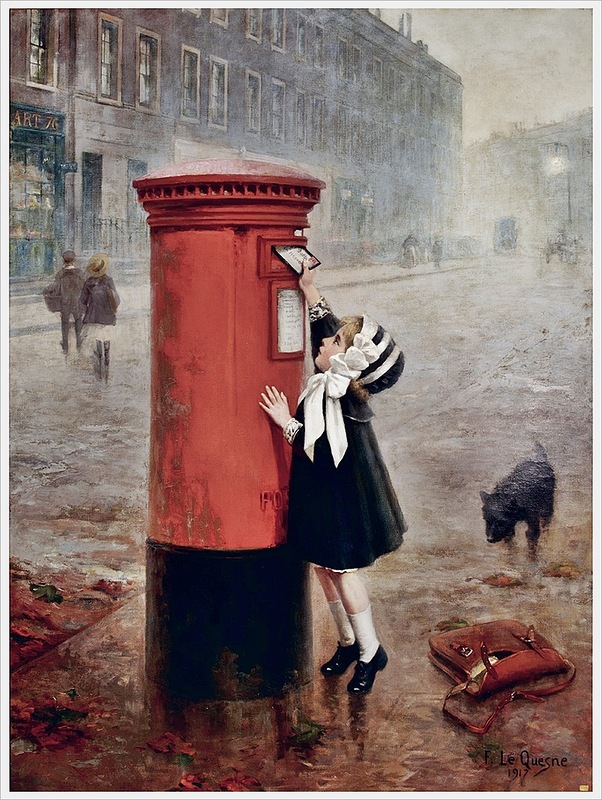
Readers who do not understand French may feel frustrated by the great number of posts about Minou Drouet, all written in that language, and looking quite informative. I have written in Pigtails in Paint a long article on Minou’s life, which contains many details unknown to the general public.
Minou Drouet generally wrote in French, but her second volume, Le Pêcheur de lune (1959), contains two poems in English: “The pillar-box’s song” and “Then they come.” I reproduce here the first of the two. To it was appended a note by Minou (in French), saying that doctors of the University of Oxford, having read these two poems, insisted for them to be included in English, finding them of an absolute purity of language; now the most bewildered by this was Minou herself, as she had written them for fun.
Pour Dorothy Thickett, my Tandothy.
THE PILLAR-BOX’S SONG
Pillar-box, pillar-box
Where are you now?
When running
Along the mud-clad streets
All this day long
I never could
Find you,
Navy-blue-headed
Pillar-box!
Could you know,
Dear pillar-box,
All the sweet gifts
In my pocket sleep
To water your mouth with.
If ever I can catch you
At the corner of a street,
So many sweet thoughts
Are in the letters
I intend to slide
Into your mouth
That all your body
Will burst
Up to, Up to, Up to
The top
Of this lace-dressed finger
Paris scrapes
Her eye with,
This unforgettable finger
Called la Tour Eiffel.
Pillar-box, pillar-box,
Into your iron-hand
I will drop all my heart.
It beats and sings
In a letter
Which sends to a green-hatted
Always smiling
Sweet-faced
Auntie of mine
To whisper
Into her ear:
A merry Christmas
Ring me jolliest bells
For you
And everyone you love …
Source of the poem: Minou Drouet, Le Pêcheur de lune, Pierre Horay (1959).
Previously published on Agapeta, 2017/06/30.


des docteurs de l’Université d’ Oxford, après avoir lu ce poème, ont insisté pour qu’il
figure en anglais, le trouvant d’une pureté de langue absolue. Elle l’avait écrit pour
s’amuser
the above typed note on the reverse of the text of the poem in English was found in the estate of the late Jean Seznec, Marshal Foch Professor of French Literature at Oxford University.
Yes, in Le Pêcheur de lune, one reads something similar after the poem, except that it is in the plural: “ces deux poèmes,” “ils figurent” and “les trouvant.” Then: “Ben, la plus ahurie, ça a été moi, car je les avais écrits pour m’amuser.”